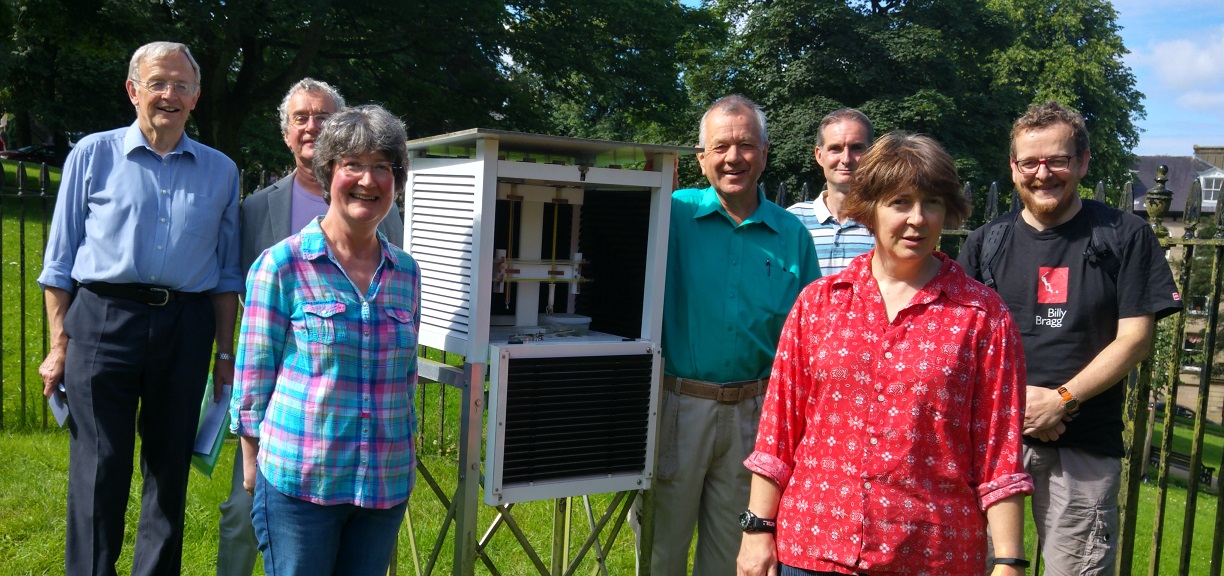Buxton’s hottest day? Well, almost that is! As the mercury peaked in the UK this week, temperatures have been soaring across Europe amid a heatwave that all time broke records. Paris saw a record high of 42.6C (108.7F) on Thursday. Meanwhile Belgium, Germany, Luxembourg and the Netherlands also reached new record highs, of 41.8C, 41.5C, 40.8C and 40.7C respectively, according to the MetOffice. The current heatwave in Europe is the second in as many months.
Today the Met Office have reviewed their records and are now provisionally reporting Thursdays high of 38.7C in Cambridge University Botanical Gardens as the hottest day ever on record in the UK beating the previous record of 38.5C in Faversham in August 2003. The Met Office say this new record will require ‘quality control and analysis over the next few days’.
Buxton’s hottest day ever – almost….
Buxton often experiences less intense heat in comparison to the south of England and in particular London and the South East, but not this time. Warm weather has been intensifying all week, with a large storm on Tuesday evening with some spectacular lightening.
Temperatures rapidly increased again on Thursday 25th July across Europe and the UK and Buxton saw it’s second highest temperature on record with a high of 32.4C recorded at Buxton Climatological Station located on the The Slopes.
The weather station is managed and accredited by the Met Office and manned by a group of local volunteers collecting data 365 days a year. Michael Hilton, one its long standing volunteers and owner of highly regarded website buxtonweather.co.uk said, “We’ve been checking data throughout the day today and looking through 160 years of weather records and this is almost an all time high! The highest temperature ever recorded in Buxton at the weather station was 32.7C on 3rd August 1990”.
Surprisingly, previous highs in Buxton occurred many years ago. “The third highest ever recorded was on 9th August 1911 at 31.3C. Other top temperatures were also in the early 1900s”, said Michael.
What is Buxton Climatological Station?
Buxton Climatological Station is managed and accredited by the Met Office and manned by local volunteers. It was saved from closure in June 2016 when because of financial constraints, problems arose for High Peak Borough Council in providing staff for the daily task of reading instruments and logging results from the weather station. That’s when Michael Hilton and others decided to step in and save the station from being permanently closed. “There’s huge value in collecting the data at the station and it could be so useful in the future in regards to say climate change and global warming”, said Michael.
As one of the oldest continuously recording weather stations in the UK, it records temperatures, humidity, rainfall, and much more – and even details like the daily temperature of the soil, one metre (3 feet) below the ground.
It was in 1868, the people of Buxton, subscribed to the setting up of a weather station, to record temperatures, rainfall, and other details – this was initially placed in the grounds of the Devonshire Royal Hospital, and the readings were taken by a local chemist.
In 1925 the equipment was moved to the present site on the Slopes – and until 2016, the readings were undertaken by staff working at High Peak Borough Council working at the Town Hall in Buxton.

The Buxton Weather website gives detailed weather information and forecasts for the area which is updated daily as well as traffic updates on major roads in and out the town and invaluable road condition updates during winter.
What has caused the latest UK heatwave? Is it climate change?
This weeks weather is caused by the Jet Stream – a fast moving ribbon of air which moves across the Northern Hemisphere across the Atlantic Ocean and west of the British Isles and Ireland. When the jet stream dips south, polar air fills in the trough, bringing heavy rains and cooler-than-usual temperatures, as has happened across much of the United States with a record-late arrival of spring and above-average precipitation. When the jet stream bulges northward, warmer air rushes into the ridge, leading to hot, dry conditions, as has happened this week in Europe. Seasonal variations are expected but since the early 2000s as the planet has warmed, the jet stream has been behaving strangely. The jet stream appears to have slowed and become more ‘wavey’ and when it slows down or get stuck high or low pressure weather systems caused by the jet stream are lasting unusually much longer and periods of intense weather are stretched out and intensified. Only time will tell is this becomes more of a norm.
Huge thank you to Michael Hilton for sending this data onto to us so quickly – we know he must have been kept rather busy by this latest spell of hot weather and checking through many years of records.
Did You Enjoy This?
You might like our regular newsletter. We put all the best events, cultural highlights and offers from Buxton and the Peak District in your inbox every month.
This information will only be used to send you this newsletter. It is stored in Mailchimp.











